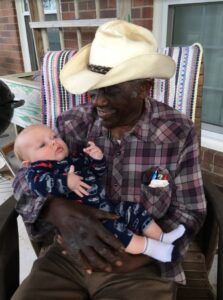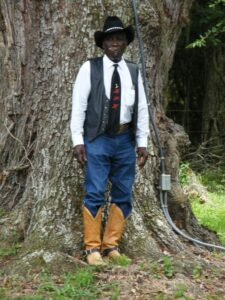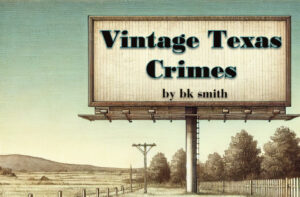The following is a tribute (not a crime story) regarding the recent passing of a 93-year-old cowboy and Texas Rodeo Hall of Fame Inductee from Brazoria County, Texas. I’m sharing it because my followers value uncovering real history through stories, even when they aren’t crime.

Taylor loved to hold the babies and teach them how to be a cowboy.
Born on February 15, 1932, Taylor “Bailey” Hall Jr. was the first son in his family. He passed away in Missouri City surrounded by family on May 8, 2025.
The following are a few memories Mr. Hall shared with journalists in his late 80s and 90s.
Taylor Hall Jr. grew up in the small community of Bailey’s Prairie, Texas, where he spent a significant amount of time with his father, Taylor Hall Sr., a ranch hand who was 22 years old when Taylor Jr. was born.
Thrilled to have his first son, young Taylor’s daddy had him riding to work with him when the child was not even a year old.
The elder Taylor Hall worked on the Stanger Ranch near Brazoria. He would often scoop Taylor Jr. off the porch where the baby would be crawling around on a pallet. He would take his son with him, despite his mother’s protests. The young father placed Taylor on the horn of the saddle, keeping him at the Stanger Ranch all day until dark. The young man and the baby boy would ride along a dirt path, a roadway now known as FM 521.
Taylor Sr. even had a unique way of feeding his son, keeping his son’s milk bottle in his chaps pocket and milking a cow straight into the bottle after rinsing it in a cattle trough. The milk would be half full of foam, which his daddy would wipe off and hand to him.
Young Taylor was adored by ranch owner Mr. Russell Stanger, who spent considerable time with him and looked out for him, treating him like family. When his father was busy breaking horses or working cows, Stanger would pick up Taylor and take him along wherever he was going, including trips to town or the bank. Riding horses quickly became a way of life for Taylor Jr. As he grew, his father got him his own horse, a paint named Jelly Bean. Taylor was so small that his reins were tied together so they wouldn’t fall, and Jelly Bean was trained to stop if they did, alerting the men to check on him.
Life at home involved his parents raising a large family of six boys and four girls. His father was a hardworking man, earning only a dollar six bits a day for tough work like breaking horses. His mother was known for her good cooking, particularly her gravy and rice, which even attracted Brazoria County Sheriff J.W. “Jack” Marshall. Marshall would sometimes visit, eat with the family, and then offer the children a ride in his car, jokingly warning them to behave or he’d put handcuffs on them.
Taylor Hall attended segregated schools, first a one-room schoolhouse in Snipe and, later, he attended school in Angleton. He even drove other children to school in a wagon pulled by mules, with his teacher giving him leeway for being late while he staked out the mule in the schoolyard.

Taylor Hall (aka Bailey’s Prairie Kid)
Taylor’s true passion lay outdoors, working cattle, riding horses, and training dogs. He worked on numerous ranches in southern Brazoria County, primarily for the Munson family for an incredible 72 years, starting when he was about 10. Early on, this work involved tasks like following a mule all day for a mule press used to bale hay. Working for ranches like Tim Tigner, the Munsons, and Cidro Valdez, he earned about $4 a day, hauling hay, fixing fences, and handling cattle and horses from sun up to sun down. This was in the early 1940s when $4 a day was considered good money, and usually included food and a calf every Juneteenth. Despite an offer from Sheriff Jack Marshall to become a deputy, Taylor turned it down, preferring the outdoor ranch life.
Taylor Hall’s introduction to rodeo came early. The first time he got on something that was bucking was at Mr. Brad Beasley’s place on Oyster Creek. He slipped off, but this experience at his first rodeo hooked him. He didn’t win any money because he hardly knew what he was doing. After seeing his determination, his parents relented, and he no longer had to sneak out to attend weekend rodeos. Rodeos were a highlight of entertainment in the 1940s and ’50s, with arenas popping up everywhere, including the McBeth RV Ranch Roundup in Bailey’s Prairie.
Initially, these early rodeos were segregated. White cowboys competed first for larger prize money, while Black cowboys rode afterward when crowds and money had dwindled. In 2023, Taylor Hall vividly recalled for journalists the day rodeos became desegregated, allowing him and his friends to ride during the main event, competing for the same attention, adoration, and prize money. His first rodeo riding with white competitors was in Bay City, which he referred to as “the white rodeo”.
As he got older, Taylor Hall committed to the rodeo life, loading up nearly every weekend to travel to the next arena. He was often seen hauling his favorite horse, Rusty, in his homemade blue trailer that matched his truck. He rode all the rough stock, including saddle bronc, bareback, and steers, and also competed in roping, bull dogging, and even milking wild cows, a team event requiring enough milk in a bottle to cross the finish line. Hall rode in an estimated 400 rodeos across the country.
For a time, Mr. Hall also worked as a rodeo clown, distracting bucking animals. In his signature style, he put his own spin on the job, once wearing a white dress, white high heels, and a veil. The crowd loved it, but judges required him to change into boots and spurs to ride. So, he rode the bull in the white dress, and reportedly “done good”. His famous trademark cigar originated at a Brazoria rodeo when a lit cigar sprinkled fire and ash down his shirt while riding a bull. The crowds responded to his tenaciousness and audacious cigar with applause, leading him to develop a persona: riding in the ring with one hand held high, dirt flying, wearing a white, starched shirt, and chomping on a big cigar. Fans began calling him “that Bailey’s Prairie Kid,” a moniker that stuck and became his sole known name to many, including those at the Clayton Library Center for Genealogical Research in Houston. He adopted the name to keep it alive, tying it to his community and its legend of Bailey’s light.
Along the rodeo circuit, Taylor Hall formed lasting friendships. He started out with Myrtis Dightman, who went on to follow a stock producer, a path Hall also wished he could have taken for the offered money and place to stay. Hall chose to stay more local to be close to his family. He also became life-long friends with James “Jimmy” Crainer, the “Jones Creek Kid”. Crainer remembered Taylor Hall as charismatic, tough, and always performing in his starched white shirt with a cigar. Crainer’s fondest memories include seeing Hall win the bronc riding at the Brazoria County Fair and witnessing his spectacular bareback ride on the “immortal” horse Apollo 13 in Egypt, Texas, which earned him a standing ovation.
Hall was also instrumental in the rodeo community. He helped start the Okmulgee Colored Rodeo in Okmulgee, Oklahoma, in 1956 with 23 other Black men. This event is the nation’s oldest African American rodeo and evolved into the popular Okmulgee Invitational Rodeo. Taylor Hall was also an original member of the Rodeo Cowboys Association Rodeo, the forerunner to the Professional Rodeo Cowboys Association (PRCA). He vividly recalls professional rides like his first professional bull ride in Duncan, Oklahoma, and facing infamous bulls like Bald Face #12 and Little Hog. The bronc Apollo 13, infamous for bluffing cowboys and sometimes hitting the fence using the rider as a buffer, tragically broke Hall’s pelvic bone in Fresno. Apollo 13 was eventually barred by the RCA because it had killed a couple of cowboys. Hall suffered other injuries too, including a knocked-up collarbone and a broken ankle. Despite seeing cowboys killed in the arena, he considered himself “pretty lucky”.
Hall’s flamboyant style and bull riding earned him invitations to Madison Square Garden in New York three times to entertain crowds. Flying there was his first plane ride, requiring some convincing. He amusingly recalled his distinct “croaker” sack standing out on the luggage carousel among the expensive leather bags. After being awarded $500 there, he generously spent part of it on candy to share with handicapped children in the grandstands.
Taylor Hall retired from rodeo in his 50s, later than most cowboys whose bodies force the decision earlier. Since retiring, he has been inducted into multiple halls of fame, including the Texas Rodeo Cowboy Hall of Fame, the Cowboys of Color Hall of Fame, and the Bull Riders Hall of Fame. He rodeoed because he liked it and never expected such accolades.
Taylor “Bailey” Hall Jr. passed away on May 8, 2025; he was a legend, and that will never change.
People often had trouble remembering his given name but never the legend.
He lived in Bailey’s Prairie in a small wood-frame house until he had to go into the hospital, and then, hospice. Until his aged body began to shut down when he was 93, Taylor Hall continued to work from sun up to sun down for the same people. His strong work ethic remained intact until his last day.
Hall liked to wear his Wrangler blue jeans, boots, and a cowboy hat, occasionally adding a red tie embroidered with “BPK” for special occasions. In his 90s, Taylor Hall didn’t age much more than what he looked like in his photos from the ’60s and ’70s. He continued to ride horses and work cows until he became ill in 2024. Late in his career, he worked regularly with the late former Sheriff and County Judge E.J. “Joe” King and the Munsons (George and Margie).
He is considered an icon and a legend in Southern Brazoria County and Bailey’s Prairie. In February 2023, the town named him their first distinguished citizen of the year. His neighbor, Cheryl, describes him as an inspiration–a testament to a life filled with hard work, perseverance, resilience, and rodeo.
Rest in peace, sir.
SOURCES
SUSAN AVERA HOLT West Brazos Weekly, “WHERE TEXAS BEGAN: ‘Bailey’s Prairie Kid’ built name in rodeo.,” March 1, 2023,
SUSAN AVERA HOLT , “At 91, ‘Bailey’s Prairie Kid’ remains a legend.,” February 22, 2023, West Brazos Weekly, The Facts, (Clute, TX).
CORINNA RICHARDSON, “The Bailey’s Prairie Kid is an icon and a legend.,” September 19, 2020, The Facts, (Clute, TX).
“Taylor “Prairie Kid” Hall Jr.,” Texas Rodeo Cowboy, https://texasrodeocowboy.com/inductees/taylor-prairie-kid-hall-jr
